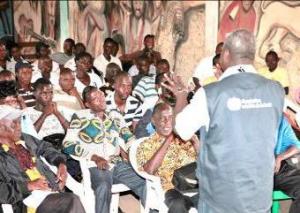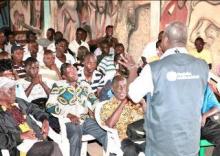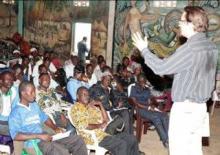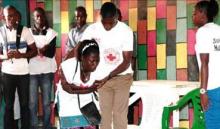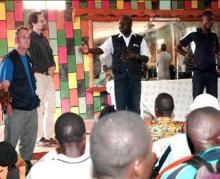Kailahun deploys 300 volunteers to monitor persons exposed to Ebola virus in communities
Freetown, Sierra Leone, 11 July 2014 - The Kailahun District Health Management Team in collaboration with WHO, Red Cross, MSF, Metabiota and other partners has trained the last batch of 300 community volunteers in the district. The volunteers comprised of community health workers and Red Cross Volunteers selected across the communities in the 14 chiefdoms in Kailahun District.
The volunteers were trained to identify and monitor Ebola signs and symptoms in persons that have had “contact” with Ebola patients.
The contact tracing has been put in place by the Ministry of Health with support from partners to facilitate active community surveillance of the disease and as a control measure to prevent further spread and interrupt transmission of the outbreak particularly among first line contacts with infected persons at family and community levels. It is also fostering social mobilization to improve awareness and community acceptance of facts about Ebola.
The volunteers are also helping to report rumours and raise alerts for the investigation teams to take prompt action.
Every exposed individual will be monitored by a contact monitor through daily visits, using a reporting form, for a period of 21 days after date of exposure. The contacts that are being traced and monitored in the communities include persons who have been together or have had closed social physical interaction (contact) in the same household with an Ebola infected person (dead or alive, confirmed or suspected), exposed to Ebola infected patients body fluids.
The volunteers are working in the communities in close collaboration with community leaders and local authorities in order to gain the confidence and support of the people to facilitate their operations. At the end of every day’s monitoring, the volunteers submit daily update to their chiefdom supervisors for onward submission to the district supervisors and subsequently to the national level in that order. More importantly, the information generated will facilitate timely field response.
Funding for the training of the 300 monitors in Kailahun was provided by UNFPA with facilitation and technical support by the DHMT, WHO, Metabiota and Red Cross.




